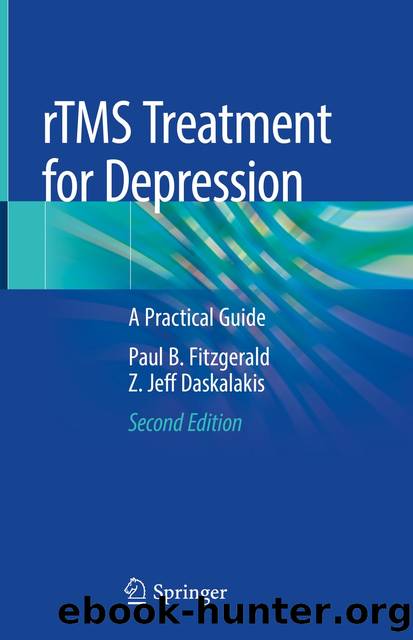rTMS Treatment for Depression by Paul B. Fitzgerald & Z. Jeff Daskalakis

Author:Paul B. Fitzgerald & Z. Jeff Daskalakis
Language: eng
Format: epub
ISBN: 9783030915193
Publisher: Springer International Publishing
9.2 TBS and Its Effects on Brain Function
The first human studies demonstrating the effects of TBS investigated its effects on the motor cortex. In the first of these studies, Huang et al. reported the effects of 5 or 15 rTMS pulses applied at 50 Hz and repeated at 5 Hz intervals. This study showed substantial and long-lasting effects on motor cortical excitability compared with single pulse TMS applied at the same intensity [2]. A subsequent study investigated the effects of the application of three pulses at 50 Hz, in much the same way that TBS is now done, repeated at 5 Hz for durations of 20â192 s. This study reported differential effects on motor cortical excitability determined by the pattern of TBS applied: cTBS applied three 50 Hz pulses at 5 Hz uninterrupted for 40 s and produced a reduction in motor evoked potential (MEP) amplitude, indicating reduced motor cortical excitability. Intermediate TBS (imTBS) applied three 50 Hz pulses at 5 Hz over 5 s, followed by 15 s of inactivity, with repeated cycles that continued for 110 seconds. This stimulation pattern induced no apparent conditioning response. iTBS also applied with three 50 Hz pulses at 5 Hz but over 2 s, followed by 8 s of rest, with repeated cycles that continued for 192 s. This iTBS stimulation pattern led to increased MEP amplitude, suggestive of increased motor cortical excitability. The direct effects of TBS paradigms on motor cortical excitability have been replicated in a number of studies although in some they have not been clearly seen and there has been considerable interindividual and intraindividual variability in these effects reported [3â6].
The striking feature of TBS is that the studies using TBS in the motor cortex have shown that it can produce changes in cortical excitability with much briefer stimulation periods than with traditional rTMS [7]. For example, the typical iTBS session is of 3-min duration and a typical cTBS session of 40-s duration. Physiological experiments in healthy control subjects suggest that lengthening the duration of TBS applied when using either paradigms does not tend to produce greater effects, and sometimes can reduce the changes in cortical excitability or even convert excitatory effects to inhibitory or vice versa [8, 9].
A limited range of studies have also explored similar effects of TBS outside of the motor cortex, in particular with prefrontal stimulation [10]. For example, we did not find that applying an iTBS train twice produced greater effects on cortical excitability than just applying the same paradigm once when assessing the effects of stimulation on prefrontal excitability using combined TMS-EEG methods [11].
There is also some uncertainty as to the optimal stimulation intensity to be used when applying TBS. The vast majority of physiological studies developing these paradigms actually applied TBS at quite low subthreshold stimulation intensities, usually the equivalent of about 70% of the RMT: clearly much lower than the stimulation intensities used in a standard rTMS therapeutic paradigms. When we evaluated the electrophysiological effects of iTBS applied at either 50%,
Download
This site does not store any files on its server. We only index and link to content provided by other sites. Please contact the content providers to delete copyright contents if any and email us, we'll remove relevant links or contents immediately.
Spare by Prince Harry The Duke of Sussex(5174)
Machine Learning at Scale with H2O by Gregory Keys | David Whiting(4292)
Fairy Tale by Stephen King(3370)
Will by Will Smith(2906)
The Bullet Journal Method by Ryder Carroll(2559)
Hooked: A Dark, Contemporary Romance (Never After Series) by Emily McIntire(2545)
Rationality by Steven Pinker(2351)
It Starts With Us (It Ends with Us #2) by Colleen Hoover(2339)
Can't Hurt Me: Master Your Mind and Defy the Odds - Clean Edition by David Goggins(2322)
Friends, Lovers, and the Big Terrible Thing by Matthew Perry(2219)
The Becoming by Nora Roberts(2188)
Love on the Brain by Ali Hazelwood(2059)
A Short History of War by Jeremy Black(1842)
The Strength In Our Scars by Bianca Sparacino(1840)
HBR's 10 Must Reads 2022 by Harvard Business Review(1839)
Leviathan Falls (The Expanse Book 9) by James S. A. Corey(1726)
A Game of Thrones (The Illustrated Edition) by George R. R. Martin(1717)
515945210 by Unknown(1660)
Bewilderment by Richard Powers(1607)
